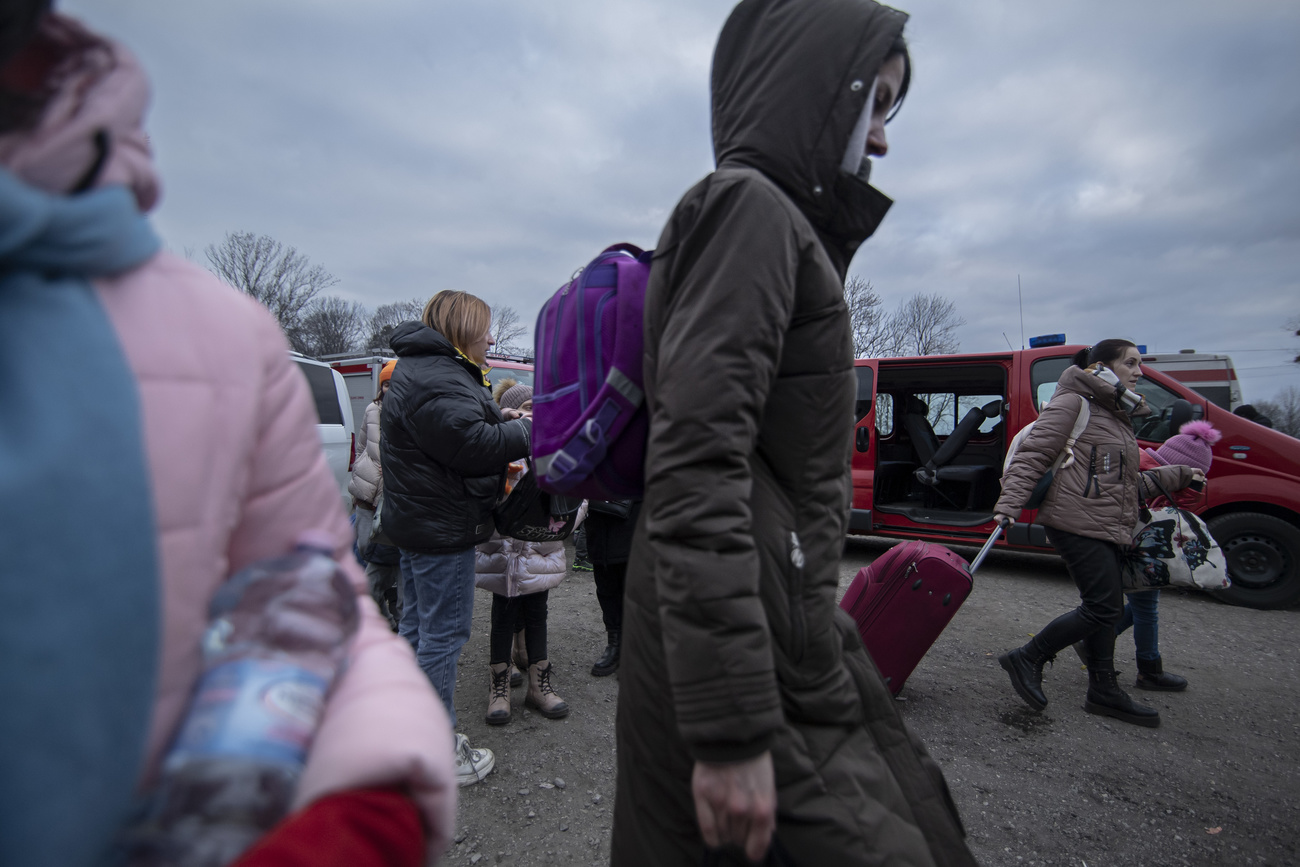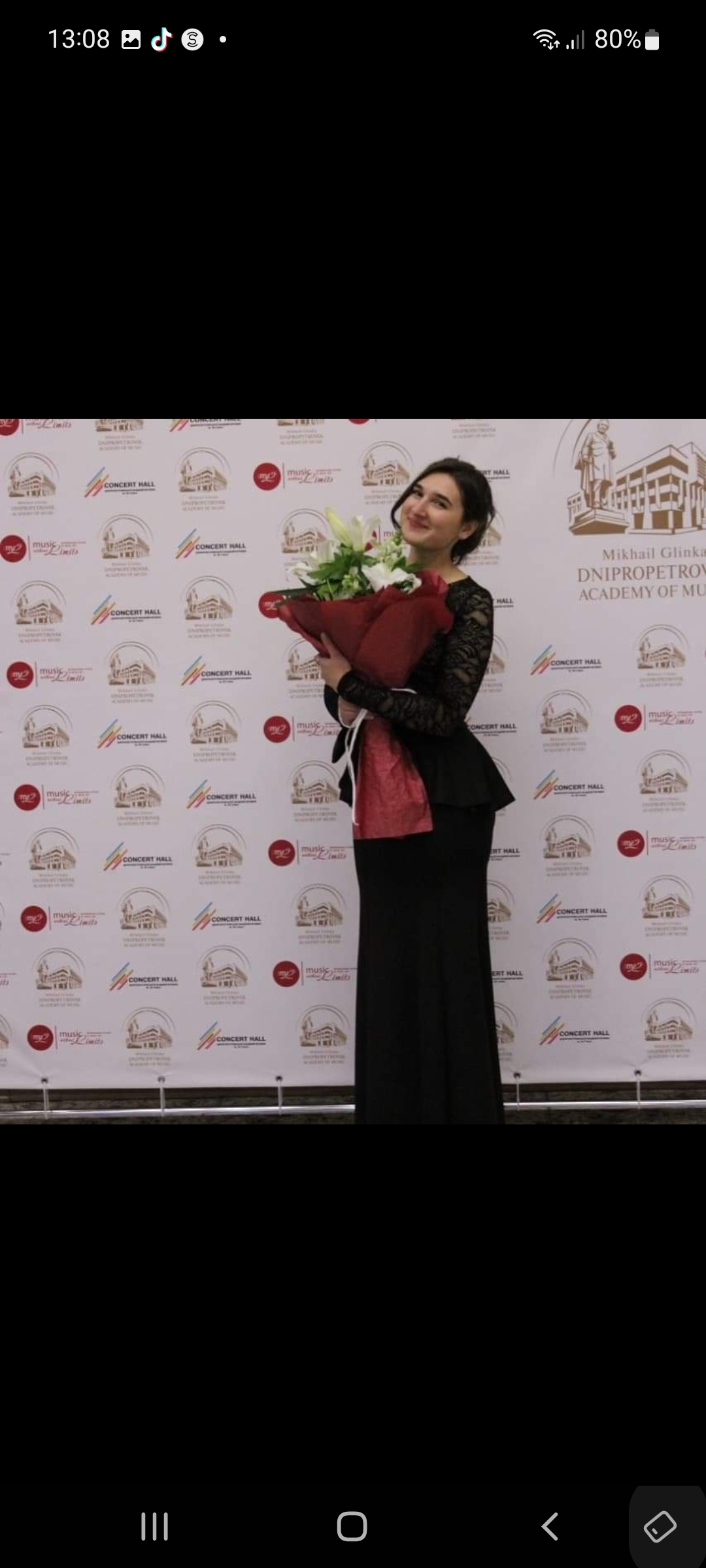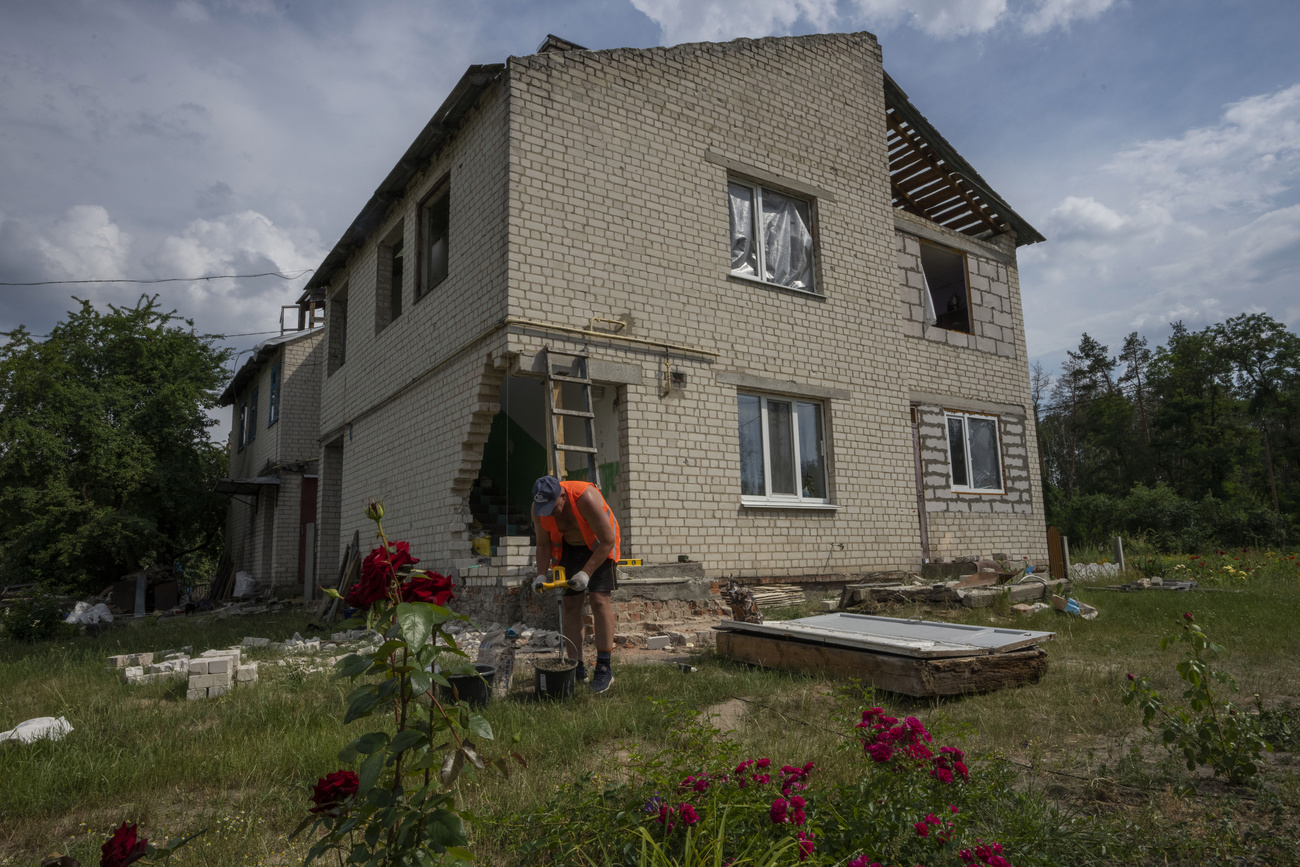
Ukrainian refugees struggle with life away from home

More and more Ukrainian refugees are leaving the security of Switzerland to return home. For them, feeling uprooted after Russia invaded their country is more unbearable than the war.
Alina Dubyna returned home to Ukraine at the end of June, after nearly three months in Switzerland. She was reunited with her family and found her apartment intact, but so much in her life has changed.
Prior to the war, the young soprano sang with the philharmonic orchestra in Chernihiv, in the north of the country. Today she is unemployed because most of the orchestra members have fled to other parts of Europe. Almost six million people – 90% of whom are women and children – have left Ukraine since the war started in late February, according to the UN Refugee Agency (UNHCR).
The city of Chernihiv, which had close to 300,000 inhabitants before the Russian invasion, has suffered massive destruction. The region is less frequently under attack now than in spring, but it has recently been targeted by missilesExternal link.
“My feelings are complicated,” Dubyna told SWI swissinfo.ch by phone via a Ukrainian translator. “I’m reunited with the country I love so much, but it’s no longer the same Ukraine.”

More than 60,000 Ukrainians have found refuge in Switzerland so far, but the flow of new arrivals is slowing. Justice Minister Karin Keller-Sutter told the Aargauer ZeitungExternal link in mid-July that more and more Ukrainians were returning to their homeland. “They consistently express a desire to contribute to the reconstruction of Ukraine,” she said.
By the end of June, according to the latest statistics published by the State Secretariat for Migration (SEM), nearly 500 refugees with S permits had officially left Switzerland. These permits had been activated specifically for people fleeing the war in Ukraine. The number of Ukrainians returning home from Switzerland is rising, but the current total is unknown.
“Ukrainian citizens are allowed to be in the Schengen area without a visa for 90 days. It’s possible that refugees who never registered officially have also left Switzerland,” explained SEM spokesperson Anne Césard. This was the case for Dubyna.
When refugees in Switzerland are granted S protection status, they are allocated to the cantons, which are then responsible for them; the cantons also administer applications for return assistance, in consultation with Bern. The German-speaking cantons of Zurich and Aargau have recently announced that they will provide financial assistance for return worth CHF 500 per adult, CHF 250 per child, and a maximum of CHF2,000 per family. However, in a July update, Zurich minister Mario Fehr said the federal authorities should contribute more to return assistance.
Chernihiv’s devastation
Dubyna left for Switzerland because of the tragic devastation at home. At the beginning of the war, Chernihiv was besieged by Russian forces and heavily bombarded. Dubyna and her boyfriend, thinking they would be safer in the countryside, headed for the village of Ivanivka, where the young man’s parents live. But Ivanivka was bombed and hit by air strikes too, and chilling reports arrived from neighbouring villages like Yahidne that were occupied by the Russian military.
Shocked by what was happening, Dubyna reluctantly agreed to join a convoy of women and children heading to Kyiv. There she received a message from a Ukrainian friend who had escaped to Switzerland – the friend’s host family in Cugy, canton Vaud, was offering to shelter Dubyna as well. Dubyna arrived in Vaud at the beginning of April.
Swiss relatives feel helpless
The Ukrainian-Swiss artist Oksana Kornelyuk has lived in Switzerland for 20 years. She remembers feeling helpless and tormented when the war began in Ukraine. Her parents are in their seventies, and as their only child all she could think about was having them come to stay with her in Grandson, canton Vaud. They lived in Lutsk, in northwestern Ukraine. “It wasn’t the hardest-hit region of the country, but its proximity to Belarus felt menacing,” Kornelyuk explained to SWI swissinfo.ch.
Kornelyuk phoned her parents every day to try to convince them to leave. At first, her father refused categorically. “He admitted that the situation was serious only when he started seeing checkpoints in his town,” she said. In mid-March he told his daughter that he had found a bus to Poland, where it would be possible to catch a flight to Switzerland. When Kornelyuk’s parents landed in Geneva, the family felt immense relief.
While Kornelyuk’s mother began to settle in, her father’s morale sank. He felt guilty that he was safely abroad while younger Ukrainian men were not allowed to leave their country. He pointed out that his region of Ukraine wasn’t being directly affected by the war.
Kornelyuk remembers that he kept asking her “What am I doing here?” and that he was struggling to find his bearings. He was naturally gregarious but couldn’t speak a word of French. Accessing healthcare was stressful for him and he was afraid of bothering people. He was deeply attached to his homeland and missed it terribly. “He wants to die where he was born,” Kornelyuk said. “The first time I ever saw him cry was in Switzerland. His tears weren’t about the war but about feeling uprooted.”
After about a month and a half in Vaud, Kornelyuk’s father started talking about returning home. At first Kornelyuk tried to delay this – until it made her father angry. “He threatened to leave, with or without my assistance. At that point I promised to help him however I could,” she said. It broke her heart.

Common problems
Dubyna described difficulties similar to those experienced by Kornelyuk’s father. “Everything is different” in Switzerland, she said – the language, the people. She spoke no French and only very basic English. She missed her family in Ukraine. To feel closer to her relatives, she engaged with the Ukrainian diaspora in Switzerland, but this failed to help. She “thought about Ukraine every day” and wanted only one thing: to return home.
Anna Lysenko, the president of Free UkraineExternal link, an organisation that helps Ukrainian refugees settle in Switzerland, sees repeated difficulties as the refugees try to integrate. Finding stable housing is challenging. The language barrier can be extremely frustrating, whether navigating bureaucracy or looking for work. Switzerland’s high cost of living has a real impact. And these issues are easily exacerbated by a fragile emotional state.
“The war creates stress and despair, sometimes guilt at having fled, and sometimes trauma,” Lysenko said.
Returning to Ukraine: breathing again
“I knew I was safe in Switzerland, but thinking about my relatives in Ukraine was unbearable,” Dubyna explained. She admitted that she was scared to return home but added: “My happiness at being in Ukraine and my family’s joy at seeing me again overwhelmed me the moment I crossed the border.”
Kornelyuk helped her father give up his S permit and found him a seat in a minibus leaving for Ukraine at the beginning of June. “The moment I told him, he seemed to start breathing again,” she said. He shared the journey home with people returning from all over Switzerland. Kornelyuk’s mother has chosen to stay in Vaud for the time being.
Although the mass exodus of people fleeing Ukraine continues, especially from the east and south of the country, where battles are raging, French newspaper Le MondeExternal link reports that refugees are increasingly returning to Ukraine. According to UNHCR, there were almost four million border crossings into UkraineExternal link between late February and late July. The number of entries into Ukraine was negligible at the beginning of the conflict but has increased by 40% since mid-June.
“The huge wave of refugees between March and April was caused in part by fears about what might happen,” explained Lysenko. Since then, she said, some people have decided to return home because they don’t feel it is as dangerous anymore. But she also noted that “the level of risk tolerance is much higher today”.
Lysenko emphasised that returning refugees remain in the minority and tend to be those who feel they have nothing to lose. “Women with young children are not returning,” she said, and going home is simply impossible for many people “because they don’t have anywhere to return to”.
Dubyna said a number of others have, as she has, returned to Chernihiv. “Of course the region is currently safer than it was under Russian occupation,” she said. “But I think most people are simply returning because this is where they belong.”
She added that she had developed a fatalistic outlook: “In the end, everyone has their own destiny.”
In an interview in mid-July, Justice Minister Karin Keller-Sutter reminded that the S status, activated for the first time with the war in Ukraine, is not intended to keep people in Switzerland permanently. She said she had instructed the State Secretariat for Migration (…) to clarify with the cantons all questions (…) relating to a possible return “The S status was initially activated for one year, until March 2023. It can certainly be extended, but it is not enough to wait until the end of the year to think about how to organise a possible exit,” she explained.
For Karin Keller-Sutter, it is clear that most refugees from Ukraine will leave as soon as the situation allows. However, she recalled that the situation remains “very volatile and unpredictable, which is why the Confederation is working with different scenarios”.
Translated from French by Katherine Bidwell/edited by Virginie Mangin

In compliance with the JTI standards
More: SWI swissinfo.ch certified by the Journalism Trust Initiative




























You can find an overview of ongoing debates with our journalists here . Please join us!
If you want to start a conversation about a topic raised in this article or want to report factual errors, email us at english@swissinfo.ch.